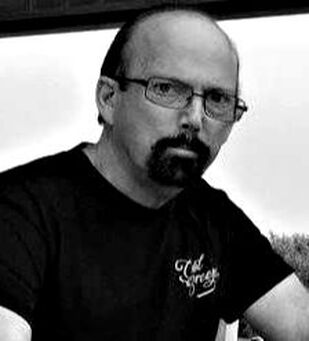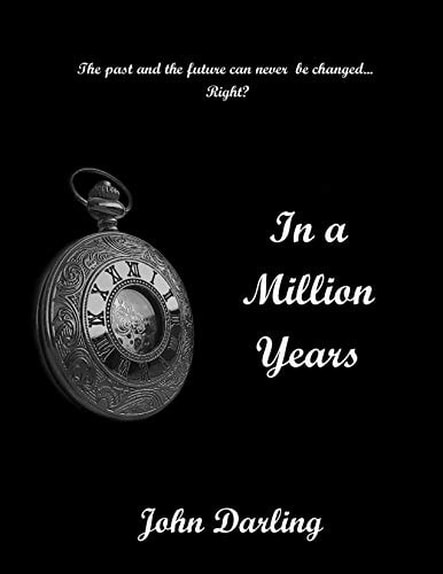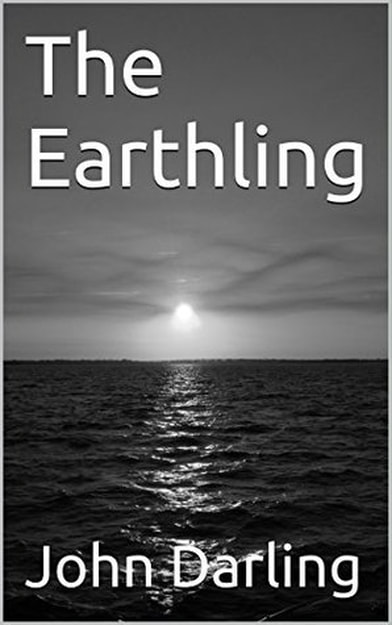
It gives me great pleasure to welcome John Darling onto the website today. John has been writing since 1976 and in this time has had numerous short stories, poems and articles published. And his one stage play Stage Directions has been produced in the US, Canada, and most recently in London.
Alex: Tell me a bit about yourself, John.
John: I was born in Flint, Michigan, then my parents moved to Phoenix, Arizona when I was seven years old. After 20 years in Arizona, I moved to California 42 years ago. I started writing after I found an old typewriter abandoned in an alley. After buying a ribbon and getting it cleaned up, I started writing a horror story called The Monster of Mulville. I never finished it, but I still have the manuscript.
Alex: How would you describe your writing, and are there particular themes that you like to explore?
John: I write about things I want to write about. Whatever comes to mind. I write in virtually all genres, mystery, science fiction, romance, creative non-fiction, and so on. While most of my work is comprised of short stories and articles, I have had some poetry published and I have written one, one-act play which has been produced four times. The last time it was produced was at the Soho Theatre in London, England as part of the Celebrity Showcase.
Alex: Tell me a bit about yourself, John.
John: I was born in Flint, Michigan, then my parents moved to Phoenix, Arizona when I was seven years old. After 20 years in Arizona, I moved to California 42 years ago. I started writing after I found an old typewriter abandoned in an alley. After buying a ribbon and getting it cleaned up, I started writing a horror story called The Monster of Mulville. I never finished it, but I still have the manuscript.
Alex: How would you describe your writing, and are there particular themes that you like to explore?
John: I write about things I want to write about. Whatever comes to mind. I write in virtually all genres, mystery, science fiction, romance, creative non-fiction, and so on. While most of my work is comprised of short stories and articles, I have had some poetry published and I have written one, one-act play which has been produced four times. The last time it was produced was at the Soho Theatre in London, England as part of the Celebrity Showcase.

Alex: Are you a writer that plans a detailed synopsis or do you set out with a vague idea and let the story unfold as you write?
John: I always say I write by the seat of my pants, so I have never written a synopsis as such since all of my work is short, but when I write time travel stories, I use Excel spreadsheets to create time lines so I can keep track of where my characters are at any given time... so to speak.
Alex: Tell us about your latest novel.
My latest “novel”, is called In A Million Years, and is really a book which I produced by combining three separate, interacting, time travel stories. One of the stories was written over 30 years ago. All of my other books are collections of short stories or non-fiction shorts.
Alex: What was the first book you read?
John: Penrod by Booth Tarkington. This book started my love of reading when I was nine years old and eventually lead to my love of writing.
Alex: How much research do you do and what does it usually entail?
John: This can vary from story to story. I think that the best fiction or science fiction has to have some basis in facts. In A Million Years, in which all three parts of the book takes place in actual historical settings, took a great deal of research. I also recently wrote a short story, called Up!, which is about a time when the Earth loses its gravity, I had to conduct hours of research to make the event seem plausible even though the story is a work of science fantasy. I must have done a good job at it since the story has been published three times and was also made into a podcast on Tall Tale TV.
Alex: Do you ever base your characters on people you have encountered in real life?
John: Almost all of them. I do this because it makes them more real to the reader. In the first part of In A Million Years, there are two scientist who argue about the structure of time. Though I never met the men, I based the scientists on Gene Siskel and Roger Ebert who once hosted a long-running show called At The Movies. At one point in the story, one scientist gives the other scientist a thumbs up just before he is swept away in time.
John: I always say I write by the seat of my pants, so I have never written a synopsis as such since all of my work is short, but when I write time travel stories, I use Excel spreadsheets to create time lines so I can keep track of where my characters are at any given time... so to speak.
Alex: Tell us about your latest novel.
My latest “novel”, is called In A Million Years, and is really a book which I produced by combining three separate, interacting, time travel stories. One of the stories was written over 30 years ago. All of my other books are collections of short stories or non-fiction shorts.
Alex: What was the first book you read?
John: Penrod by Booth Tarkington. This book started my love of reading when I was nine years old and eventually lead to my love of writing.
Alex: How much research do you do and what does it usually entail?
John: This can vary from story to story. I think that the best fiction or science fiction has to have some basis in facts. In A Million Years, in which all three parts of the book takes place in actual historical settings, took a great deal of research. I also recently wrote a short story, called Up!, which is about a time when the Earth loses its gravity, I had to conduct hours of research to make the event seem plausible even though the story is a work of science fantasy. I must have done a good job at it since the story has been published three times and was also made into a podcast on Tall Tale TV.
Alex: Do you ever base your characters on people you have encountered in real life?
John: Almost all of them. I do this because it makes them more real to the reader. In the first part of In A Million Years, there are two scientist who argue about the structure of time. Though I never met the men, I based the scientists on Gene Siskel and Roger Ebert who once hosted a long-running show called At The Movies. At one point in the story, one scientist gives the other scientist a thumbs up just before he is swept away in time.

Alex: Which was the last book you read that blew you away?
John: It was a John Grisham novel called The Last Juror. The reason it affected me so much is because there are so many elements with so many layers in it. Grisham manages to weave all of them together while keeping the overarching story, about the bond between a young white man and an older black woman in Clanton, Mississippi during the 1970’s, always in your mind. It is funny, sad, heartwarming, inspiring, and it confronts real issues at the time in a way that makes you think you are living in the town.
Alex: How do you market your books?
John: Amazon is my main market place, but I also have a Biblio account where I sell used books along side of my books which I purchase from Amazon with my author’s discount.
I advertise my books via social media, my author’s website, and some times live and in person at various craft fairs in my town.
Alex: What are your interests aside from writing? And what do you do to unwind?
John: Fishing and biking. I am a member of a bike club and I have written several articles about biking for their monthly newsletter. I also have a fishing blog at called The Old Man and the Seas at https://theoldmanandtheseas.wordpress.com, where I write about my over 60 years of fishing experiences including the lessons my grandfather taught me about the sport.
Alex: Which authors do you particularly admire and why?
John: John Grisham for his gripping plots. Kurt Vonnegut for wonderful insanity. Michael Connely for his action-packed stories. Mary Stewart for her beautiful prose. I also like Michael Chrichton and Steven King but I do not like all of their works.
Alex: Great to hear Kurt Vonegut's name. I think it's the first time he has been mentioned in these pages. Long overdue, in my opinion. Thank you so much for sharing your thoughts, John.
John: My pleasure, Alex.
John: It was a John Grisham novel called The Last Juror. The reason it affected me so much is because there are so many elements with so many layers in it. Grisham manages to weave all of them together while keeping the overarching story, about the bond between a young white man and an older black woman in Clanton, Mississippi during the 1970’s, always in your mind. It is funny, sad, heartwarming, inspiring, and it confronts real issues at the time in a way that makes you think you are living in the town.
Alex: How do you market your books?
John: Amazon is my main market place, but I also have a Biblio account where I sell used books along side of my books which I purchase from Amazon with my author’s discount.
I advertise my books via social media, my author’s website, and some times live and in person at various craft fairs in my town.
Alex: What are your interests aside from writing? And what do you do to unwind?
John: Fishing and biking. I am a member of a bike club and I have written several articles about biking for their monthly newsletter. I also have a fishing blog at called The Old Man and the Seas at https://theoldmanandtheseas.wordpress.com, where I write about my over 60 years of fishing experiences including the lessons my grandfather taught me about the sport.
Alex: Which authors do you particularly admire and why?
John: John Grisham for his gripping plots. Kurt Vonnegut for wonderful insanity. Michael Connely for his action-packed stories. Mary Stewart for her beautiful prose. I also like Michael Chrichton and Steven King but I do not like all of their works.
Alex: Great to hear Kurt Vonegut's name. I think it's the first time he has been mentioned in these pages. Long overdue, in my opinion. Thank you so much for sharing your thoughts, John.
John: My pleasure, Alex.
